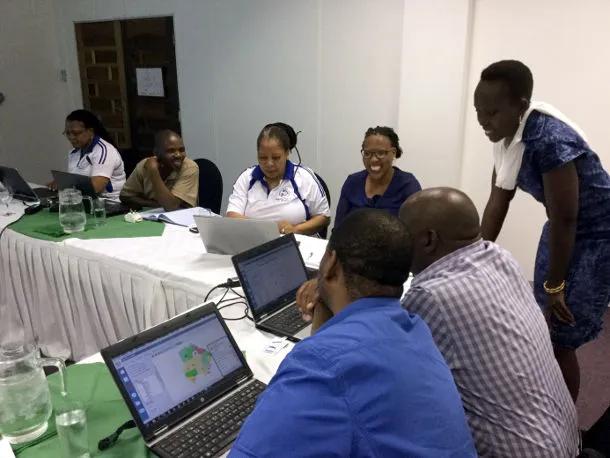
From October 22-30, International IDEA’s Electoral Processes and Africa programmes facilitated a series of activities in collaboration with the Election Management Bodies (EMB) of two of its Southern African member states – South Africa and Botswana – on the Electoral Risk Management Tool (ERMTool).
International IDEA developed and launched the ERMTool as a global public good in October 2013. The tool is designed to empower stakeholders that have either a mandate or an interest in ensuring the conduct of peaceful and crebidble electoral processes. The tool’s intended users are electoral management bodies, security sector agencies, civil society and other state or non-state actors.
With the country preparing for municipal elections in 2016, the Election Commission of South Africa (IEC) invited International IDEA to present the ERMTool to its commissioners and senior staff as it considers whether to adopt the tool to strengthen its risk management strategy. The presentation was followed by a two-day technical training on the ERMTool for twenty-four IEC officials from the headquarters and provincial offices. In welcoming International IDEA staff to its offices in Tshwane, IEC Vice Chairperson Terry Tselane reminded participants of the close partnership between International IDEA and the IEC and expressed his hope that this partnership can be further strengthened through the use of the ERMTool.
In Botswana, the sequence of events followed a similar pattern with International IDEA providing an introductory presentation to the ERMTool, followed by a two-day technical training for ten IEC staff members. Botswana will not hold national elections until 2019, however the Commission is interested in adopting the ERMTool ahead of the new electoral cycle.
In welcoming International IDEA to the IEC, the Secrerary of the IEC, Gabriel Seeletso mentioned that even though “Botswana has a history of peaceful elections, the Commission wants to take a proactive and pre-emptive approach to its management of the electoral process to prepare for any eventuality and we believe the ERMTool can assist us in this regard”.
The technical trainings in both countries aimed to to develop participants’ skills in using the main features of the ERMTool, notably the knowledge resource library, the analytical instruments, the risk and action register and the prevention and mitigation module. Following the training, participants now have the capacity to utilize the ERMTool software application to identify, assess and manage and track electoral risks in their countries.
Asked about the most important thing she learnt during the training, Nametsegang Boleseng of the IEC-Botswana said that “the tool has taught me that it is possible to do risk management on all the activities within the EMB which might become risks in the long-run”.
The activities in both South Africa and Botswana were co- facilitated by Irene Tulel, the ERM Project Coordinator at the Independent Electoral and Boundaries Commission (IEBC) of Kenya who was also able to share her EMB’s experience in institutionalizing risk management. This type of peer exchange is critical to International IDEA’s joint strategy with the African Union to promote electoral risk management as a new ‘best practice’ in administering elections on the African continent.
Over the coming weeks and months, International IDEA will continue to provide advice and assistance as the EMBs of both South Africa and Botswana consider how to integrate the ERMTool into their day-to-day activities.



